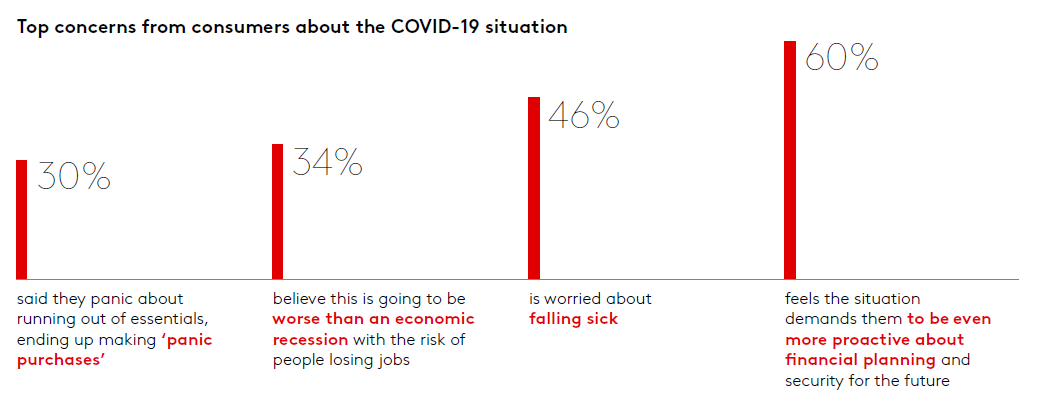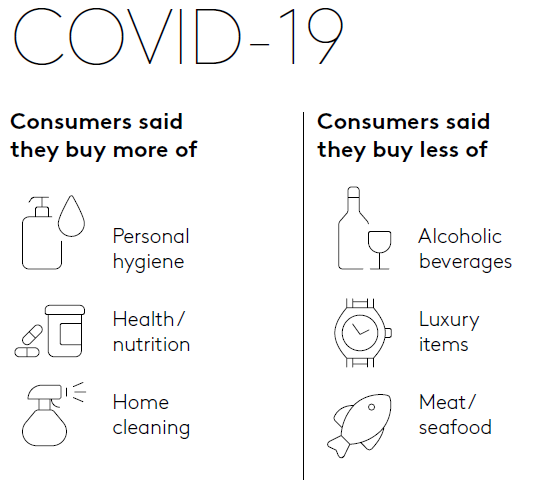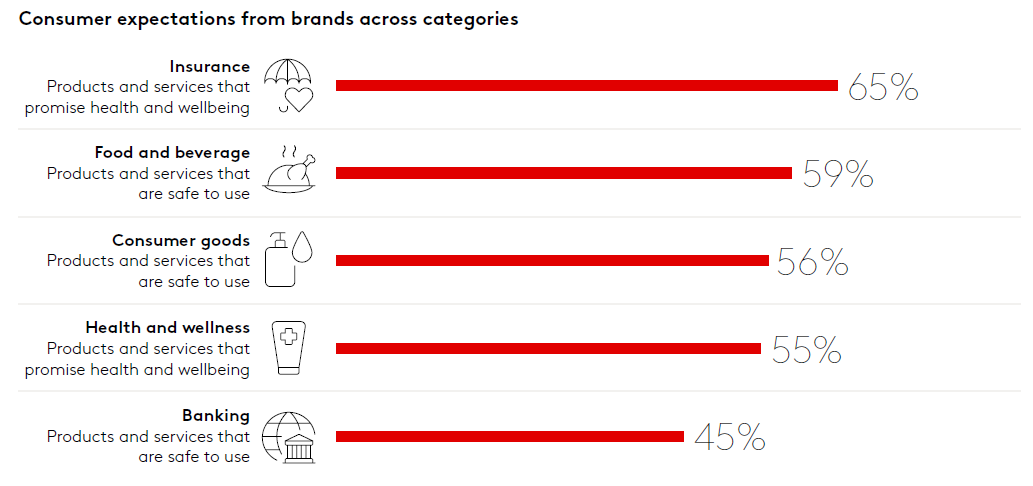Hotline:
+84 934241168As we enter the third month of the COVID-19 outbreak which is originated from Wuhan, Mainland China, the virus is spreading across the world quickly. It had infected more than 90,000 people all over the world. The cases which have been infected in Korea and Italy went up dramatically. Action plans from governments are quickly […]
As we enter the third month of the COVID-19 outbreak which is originated from Wuhan, Mainland China, the virus is spreading across the world quickly. It had infected more than 90,000 people all over the world. The cases which have been infected in Korea and Italy went up dramatically. Action plans from governments are quickly taken to prevent the outbreak of COVID-19 from out of control.
Interestingly, the top fear is not falling sick but the threat that the virus may hurt individual’s financial health, according to a new study of Kantar. As the global financial markets drop down which seems to the the worst since the Global Financial Crisis, 60% Asian people are worried for their financial security. Fear of catching the virus ranked second (46%) and is highest in Japan (68%). Over a third of Asians (34%) fear COVID-19 could push economies to the brink of recession. Koreans are most concerned about their financial health (77%) and job losses (61%).

Almost half (48%) of consumers in the region are ‘hugely concerned’ about the impact of COVID-19 on their day-to-day lives. People living in countries with the highest number of cases (South Korea and Japan) think they are most likely to get the virus and are worried that their lives has been disrupted. People living in countries with the highest number of cases (South Korea and Japan) think they are most likely to get the virus and are worried that their lives will be disrupted. The level of trust in how the government is handling the crisis is very low in South Korea (39%) and Japan (9%). In Singapore, where only 33% are concerned, 78% say they believe the government’s approach to handling the crisis.
According to Kantar, a market research firm of the stock price evolution of over 100 consumer goods companies across Asia, only a small group is developing business continuity plans to improve their value since COVID-19 started spreading. Brands can refer to Kantar’s research to understand consumer insight today. What brands do to cope with the current crisis may well affect their users in the future.
The study shows how people are adjusting their lifestyles to reduce the risk from COVID-19. The industry that has been hardest hit by the outbreak is travel, with 59% of people saying that they have decided to travel less to stay safe. This is followed by 52% saying that they are less likely to eat out, and the same number (52%) saying that they are avoiding socialising outside of the house. Instead, people are choosing to stay in, with 42% streaming more content, 33% hosting get-togethers at home and 30% ordering in food.
Kantar’s study also reveals that in the past 2 months, online shopping increased by 32%.People choose to shop online to avoid crowded supermarkets or use e-commerce channels to get “sold out” items at traditional stores. Koreans have the highest increase in online shopping (41%). Online grocery platforms and food delivery services saw the highest increase, resulting in many providers having to adjust their strategies to deal with the demand. In contrast, shopping in retail outlets has been reduced by 35% over the same period.
Predictably, categories related to hygiene and health have witnessed the biggest increase in purchases, with 48% of people saying they are buying a lot of personal hygiene items like masks and hand sanitizer, 45% buy more nutritional and health items like vitamins to improve immunity, and 40% report that they are spending more on home cleaning products. On the other hand, people are spending less on alcoholic beverage (30%), a trend also seen in SARS. In addition, fewer people are buying luxury goods (27%) and meat and seafood (21%).


People want brands to provide them with the safety and security they need to get on with their daily lives. Assurance that brands are transparent, trustworthy and in control of their supply chains. Also, brands with enhanced health and well-being benefits to help build a strong defence against the virus.
This is based on an online survey of 3,000 consumers between the ages of 18 and 60 across six countries in the region: Singapore, Indonesia, Philippines, Korea, Japan and Thailand. Research was conducted during the period from 25 – February 27, 2020. Source: Kantar

Manage your cash to keep your business running
Basically, profit means you’ll have money in the bank, but manage cash flow means knowing when money will arrive and when you’ll have to spend it on future expenses.

How to track your business finances all year long?
An easy way to begin with tracking your business finances is to get to know the 3 basic financial reports that can help you to evaluate your business’ financial health.

COVID-19: Which costs should business cut down to optimize their profit?
In this week, there is news that GM, Pandora, Asian Airlines,… has fired thousands of employees which sets off the alarm of reducing staff size all over the world due to SARS-CoV2 (COVID-19). The outbreak of COVID-19 leads to bankruptcy of numerous companies, even big corp, thereby causing cost-cutting to optimize their profits and continue […]

Record-to-Report là gì? Quy trình R2R giải pháp hoàn thiện quy trình kế toán
Quy trình hoàn tất phê duyệt tài chính (financial close) có thể là một ác mộng đối với bộ phận kế toán. Yêu cầu gửi về ngày một khó hơn, cùng với đó, công ty cần cập nhật báo cáo và phân tích nhanh hơn. Không phải phóng đại nhưng công ty càng phát triển, […]
Lasted news

